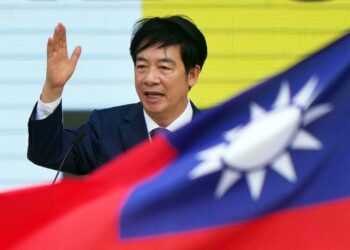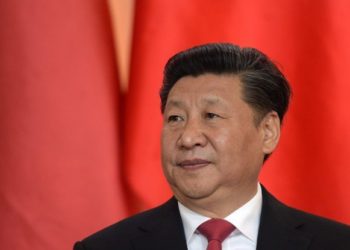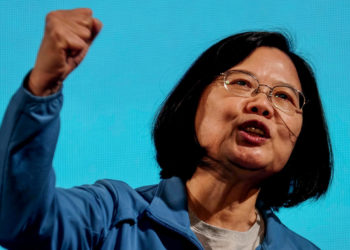As tensions over North Korea escalate, it is important to remember that there is, and always has been, only one solution to the problem: convince China that the costs of a reckless North Korea are too large to bear.
In the past, analysts have occasionally suggested that a quick strike military operation could destroy North Korean nuclear capabilities and successfully resolve the dispute. To the extent that this was ever more than wishful thinking, one presumes that the risks of military action have now become far too great. “Fire and fury,” in other words, is almost certainly an empty threat.
Assuming the military option is off the table, China must be a part of any solution. China is Kim Jong-un’s benefactor, and has been an increasingly generous one as China’s own fortunes have risen over the past two decades. Over that period, China’s trade with North Korea has grown tenfold, and China now constitutes or facilitates up to 80 percent of all North Korean trade.
But rather than using this dependency to rein in North Korea’s military ambitions, China has instead used its leverage to sustain the North Korean economy, forestalling the regime’s collapse. Although the vast majority of North Koreans still suffer greatly, it is likely no coincidence that North Korea’s last great famine—which led to hundreds of thousands of deaths from starvation between 1994 to 1998—came just prior to the point that Chinese economic growth, and patronage of the North Korean regime, accelerated.
Critically, the Chinese government seems to have tight control over its trade with North Korea. A recent report by the non-profit group C4ADS found that North Korean trading networks are highly centralized, with close or common ownership ties found between most of the Chinese companies doing business with the regime. This emphasizes the extent to which trade with North Korea is used as a policy lever for the Chinese government, and is not merely a series of business decisions by enterprising Chinese.
As a case in point, reports indicate that China’s recent reduction in coal imports from North Korea, intended as punishment for the regime’s missile tests as well as the assassination of Kim Jong-nam, may have been simultaneously offset by increased Chinese imports of iron ore, thus mitigating any loss of revenue for the North Korean government.
The key question then is how to motivate Chinese cooperation in defusing what is rapidly becoming a crisis. There are, of course, no obvious answers to this question, but the U.S. will likely need to apply pressure to sensitive parts of the Chinese government body.
The Trump Administration has made attempts at this by using trade with China as both a carrot and stick on the North Korea issue. But any degradation in trade relations between the U.S. and China would be bad for both countries. Furthermore, President Trump has threatened, and recently acted, to raise barriers to trade with China regardless of cooperation on North Korea, and so these are rightly seen by China as mostly empty threats.
The U.S. government will likely need to get creative. For instance, the Chinese government is loath to see its rivals Japan and South Korea acquire nuclear weapons, which would threaten Chinese military hegemony in the region. Those countries could exploit these fears and announce plans to begin nuclear programs as a response to North Korean belligerence, unless China can act swiftly and effectively to reduce tensions.
At the same time, the international community should formally promise to provide substantial resources to China in the event of the collapse of the North Korean regime, which would likely lead to a range of security and humanitarian issues. Of course, one hopes that the Trump Administration has thought well beyond these simple strategies.
Recently, Chinese Foreign Minister Wang Yi highlighted the tension in the region, stating that North Korea and its neighbors have “swords drawn and bows bent.” One hopes that Minister Yi knows that it is now time to use its leverage to play the peacemaker.






















